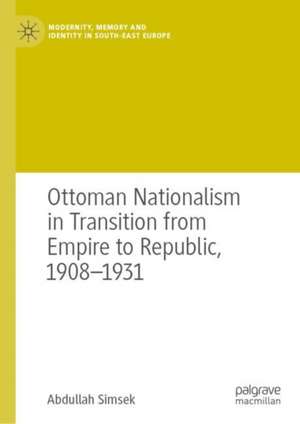Ottoman Nationalism in Transition from Empire to Republic, 1908–1931: Modernity, Memory and Identity in South-East Europe
Autor Abdullah Simseken Limba Engleză Hardback – 18 apr 2024
Din seria Modernity, Memory and Identity in South-East Europe
- 17%
 Preț: 523.81 lei
Preț: 523.81 lei - 15%
 Preț: 702.05 lei
Preț: 702.05 lei - 15%
 Preț: 471.69 lei
Preț: 471.69 lei - 15%
 Preț: 502.54 lei
Preț: 502.54 lei - 15%
 Preț: 584.26 lei
Preț: 584.26 lei -
 Preț: 380.84 lei
Preț: 380.84 lei - 18%
 Preț: 780.37 lei
Preț: 780.37 lei - 18%
 Preț: 786.36 lei
Preț: 786.36 lei -
 Preț: 386.81 lei
Preț: 386.81 lei - 15%
 Preț: 499.59 lei
Preț: 499.59 lei - 18%
 Preț: 892.11 lei
Preț: 892.11 lei - 15%
 Preț: 581.14 lei
Preț: 581.14 lei - 18%
 Preț: 887.68 lei
Preț: 887.68 lei - 18%
 Preț: 780.82 lei
Preț: 780.82 lei - 15%
 Preț: 643.16 lei
Preț: 643.16 lei
Preț: 698.80 lei
Preț vechi: 822.12 lei
-15% Nou
Puncte Express: 1048
Preț estimativ în valută:
133.73€ • 138.82$ • 111.51£
133.73€ • 138.82$ • 111.51£
Carte tipărită la comandă
Livrare economică 22 martie-05 aprilie
Preluare comenzi: 021 569.72.76
Specificații
ISBN-13: 9783031569272
ISBN-10: 303156927X
Ilustrații: X, 256 p. 1 illus.
Dimensiuni: 148 x 210 mm
Greutate: 0.47 kg
Ediția:2024
Editura: Springer Nature Switzerland
Colecția Palgrave Macmillan
Seria Modernity, Memory and Identity in South-East Europe
Locul publicării:Cham, Switzerland
ISBN-10: 303156927X
Ilustrații: X, 256 p. 1 illus.
Dimensiuni: 148 x 210 mm
Greutate: 0.47 kg
Ediția:2024
Editura: Springer Nature Switzerland
Colecția Palgrave Macmillan
Seria Modernity, Memory and Identity in South-East Europe
Locul publicării:Cham, Switzerland
Cuprins
Introduction.- Framing the Ottoman nation.- Ottomanism between ideology and realpolitik.- Revolution and disillusion.- Identity policies in action.- Claiming the homeland?.- Reframing the nation.- Conclusion.
Notă biografică
Abdullah Simsek was born in Turkey and later moved to Denmark at the age of ten, where he has resided since. He studied history, philosophy, and Middle Eastern and Islamic studies at the University of Copenhagen, where he earned both his master’s degree and PhD. His doctoral research focused on Atatürk ’s revolution, inkılap, and its cultural and socio-political impact. Subsequently, his research has centred on topics such as elite formations, identity policies, and nation-building in the Ottoman Empire and Turkey. In his differing roles as a postdoctoral researcher and external lecturer, he taught courses in nationalism, theories of modernity, and the history of the Ottoman Empire and contemporary Turkey.
Caracteristici
Explores national identity formation in the late Ottoman Empire and early Turkish Republic Highlights the importance of agency, especially the role of state elites in nation building Focuses on the interactions, discussions, agreements, and disagreements among the involved parties
